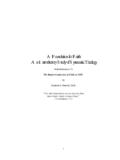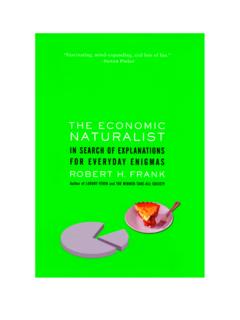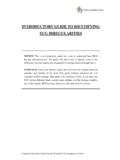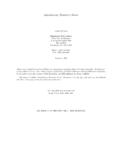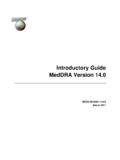Transcription of e Highly Sensi ve Person Introductory Guide - Plum Turtle
1 Are you driven by fair and equitable treatment for individuals more than personal gain? Do you build alignments and encourage collaboration more than you seek to gain power? Do you recoil from conflict but lean deeply into creativity? Has your natural, gentle openness been mistaken for weakness? Do you have a strong intuition? Have you been called too sensitive?You may be a Highly Sensitive Person ! (20% of the population are.) This Guide explores what High Sensitivity is, and almost more importantly, what it is not. You may be surprised to learn that High Sensitivity is not a weakness, but a source of tremendous yet often unrecognized Guide will help you understand if you are Highly Sensitive, and if you are, how to uncover your strengths and use those strengths and to create a positive impact on the world.
2 This Guide is a generalized introduction to High Sensitivity. As everyone is different, some of this Guide may apply to you and some of it may not. It is our desire that this Guide will inspire you to learn more about yourself, your sensitivity, and your own unique Guide explores: What High Sensitivity is What High Sensitivity is not Self-assessment to see if you are Highly Sensitive Common physical traits of Highly Sensitive People Common heart/mind traits of Highly Sensitive People Difficulties faced by Highly Sensitive People A few famous Highly Sensitive People Sensory overload Techniques for coping with overload Next stepsAbout your authors:I am Colleen O Rourke and I am a Highly Sensitive Person (HSP).
3 I am a coach, an adventurer, and a creative force for change. I am on a mission to bring the gifts of HSPs to the world and I can only accomplish this through you, other sensitives. This Guide was created along with Elizabeth Walsh, also an HSP, who is an extraordinary integrated body worker working in Santa Rosa, California. We hope that our work will enlighten and inspire you. You can find out more about us at the end of the Highly Sensitive Person : Introductory Guide O Rourke/Walsh 2012 Page 1 What High Sensitivity Is O Rourke/Walsh 2012 Page 2 While the term Highly Sensitive Person (HSP) is new, coined by Dr. Aron in 1992, the concept has been studied for some time.
4 Jung referred to this group as people of innate sensitiveness. High Sensitivity, also called Sensory Perception Sensitivity, refers to people who process internal and external stimuli much more thoroughly due to a biological difference in their central nervous system. Essentially, as information is received in the brain it is processed through filters that provide insight and awareness to the environment around us. HSPs simply have far more filters than other people. This provides greater insight and awareness, yet is also consumes energy and takes time to process and decide on a course of action. And, although everyone can refine their abilities, HSPs cannot simply turn-off this trait anymore than someone else can turn it on.
5 HSPs may notice higher than average awareness of and sensitivity to: The 5 standard senses (sight, sound, touch, taste, smell) Medications, caffeine, alcohol, etc. Emotions, both their own as well those of others Subtle changes in the environment Intuition or extra-sensory informationThis doesn t mean HSPs have more acute senses, but that their brain refines the data into much more detail than other brains. (HSPs don t see better, they just register more of what they see.)It is important to realize that this is a natural trait, occurring in about 15-20% of the population. Because of this trait, the mind of the Highly Sensitive Person works differently.
6 HSPs tend to: Demonstrate better than average ability to spot errors or differences Be Highly conscientious Be Highly creative Concentrate deeply with a high degree of focus Be aware of even small changes in the environment (and can be easily distracted by them) Process material to a deeper level Be specialists at fine motor movements Posses deep awareness of their own thoughts and body condition Be drawn to be of service to othersAccording to Dr. Aron, in most cases High Sensitivity is inherited. However, it is also true that sensitivity can be impacted through certain life experiences. Traumas at an early age may push a child with mild sensitivity to demonstrate traits of High Sensitivity, while exposure to certain stimuli over a long time can decrease someone s sensitivity to that stimuli.
7 What High Sensitivity is sensitivity is NOT a psychological disorder. It is not being shy or neurotic, nor does it necessarily indicate introversion. To clarify the differences, let s look at these conditions more closely: Shyness is a feeling of timidity, apprehension, or discomfort in at least some social situations. Shyness is a learned behavior. Because HSPs prefer to look before entering new situations, they are often incorrectly labeled as shy. It is natural for an HSP to hang back and observe new situations. It is not aversion; it is simply time to deeply process new sensory data. Neurosis is a functional behavior disorder with no apparent underlying cause for the feelings of ill-health it engenders.
8 Neuroses include a number of affective disorders, such as anxiety, depression, and obsessive states. When an HSP approaches stimuli overload (more on this state later), their shutdown behaviors, which may include anxiety, depression, or anger, may appear to others to have no apparent underlying cause and thus be a neurosis. Rather, the state has a very real and physiological cause to the HSP. Introverts are deeply concerned with the inner world of the mind. They enjoy thinking, exploring their thoughts and feelings. Being around people drains the energy of an introvert, while time spent alone re-energizes them. About 25-40% of the general population is introverted, while about 70% of HSPs are introverts.
9 So while there is a high correlation between being Highly Sensitive and being introverted, they are not the same Sensitivity is a normal, natural, and healthy condition of the nervous of being Highly Sensitive as similar to being left-handed: Both are a result of the makeup of the brain. Both occur in a minority of the population. Both have suffered stigmas due to their differences. Both have beneficial traits that come as a direct result from this different makeup of the is nothing wrong about being Highly Sensitive. There is only something uncommon about being Highly Sensitive. O Rourke/Walsh 2012 Page 3 Self AssessmentCheck the box next to each statement that you agree is true for you.
10 I am easily overwhelmed by strong sensory seem to be aware of subtleties in my environment or people's moods affect tend to be very sensitive to pain and find myself needing to withdraw during busy days, into bed or into a darkened room or any place where I can have some privacy and relief from am particularly sensitive to the effects of caffeine and am easily overwhelmed by things like bright lights, strong smells, coarse fabrics, or loud have a rich, complex inner am made uncomfortable by loud am deeply moved by the arts or nervous system sometimes feels so frazzled that I just have to go off by am startle get rattled when I have a lot to do in a short amount of people are uncomfortable in a physical environment I tend to know what needs to be done to make it more comfortable (like changing the lighting or the seating).

